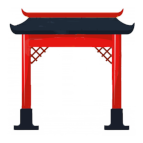|
|
些
|
 |
|
JLPT HSK 1 |
|
| some, few, several, small amount
|
Top: this/these 此 (He stopped 止 and sat 匕 down: This person!), below: two 二
These two are some, .. |
|
|
|
步
|
 |
|
JLPT HSK 2 |
|
| walk, a pace, a step, march
|
Top: stop 止 (image of a right foot that stops at a line 一 ), bottom: Variant of little 少 (traditionally: the sign for right foot, similar to 少: put one foot in front of the other)
Stop a little when: walking. |
|
|
|
正
|
 |
|
JLPT HSK 2 |
|
| correct, just (right), straight, principle
zhēng, zhèng
止
正
 |
|
Top: a line 一, bottom: to stop 止 (image of the right foot that stops at a line 一)
To stop at the line is correct. |
|
|
|
肯
|
 |
|
JLPT HSK 4 |
|
| to agree, to consent, willing
|
Top: stop 止 (footprint of a right foot that stops at a line 一.), below: body 月/肉
(Consent of vegetarians:) The stop (from consumption) of meat meets our agreement. |
|
|
|
止
|
 |
|
JLPT HSK 4 |
|
| to stop, to prohibit, until, only
zhǐ
止
 |
|
From the footprint of the right foot (turned to the left)
The foot is at the line and stops. |
|
|
|
此
|
 |
|
JLPT HSK 4 |
|
| this, these
|
Left: stop 止 (footprint of a right foot that stops at a line 一), right: sitting person 匕
He stopped and sat down: This person. |
|
|
|
址
|
 |
|
JLPT HSK 4 |
|
| address, location, site
|
Left: earth 土, right: to stop 止 (footprint of a right foot that stops at a line 一)
The 'earth' where I stop, is my address. |
|
|
|
降
|
 |
|
JLPT HSK 4 |
|
| to fall (rain), to drop, to descend, to surrender
jiàng, xiáng
阝
夂
止
 |
|
Left: hill 阝, right: upturned foot, sitting cross-legged 夂 (But here perhaps: image of dripping rain?), variant of stop 止
From the hill comes the falling rain and will stop at the bottom because it has fallen down. |
|
|
|
企
|
 |
|
JLPT HSK 5 |
|
| to plan a project, company, to stand on tiptoe
|
Top: person 人, below: stop 止 (imprint of a right foot that stops at a line 一 )
(Better to prepare at ease/calmness:) The person should stop for planning the project. |
|
|
|
歧
|
 |
|
JLPT HSK 6 |
|
| divergent, side road
|
Left: to stop 止 (footprint of a right foot that stops at a line 一), right: branch, twig 支 (hand 又 that holds a twig 十)
I stopped at the branch (of the way), because it is divergent. |
|
|
|
扯
|
 |
|
JLPT HSK 6 |
|
| to tear (cloth), to pull, to chat, gossip
|
Left: hand 扌, right: to stop 止 (Footprint of a right foot that stops at a line 一)
By hand or a stopped foot you can make things tear. |
|
|
|
耻
|
 |
|
JLPT HSK 6 |
|
| shame, disgrace
|
Left: ear 耳, right: to stop 止 (footprint of a right foot that stops at a line 一) (In traditional Chinese: 恥 with heart 心 its the derivation: "Into the ear 耳 rises (the blood) from the heart 心: you blush and are ashamed")
If the ear "stops" (won't listen) then you are ashamed? |
|
|
|
雌
|
 |
|
JLPT HSK 6 |
|
| female
|
Left: this 此 (She stopped 止 and sat 匕 down: This person), right: bird 隹
The stop-and-sit-bird is the female wheras the male 雄 is the ten-eyes-bird. |
|
|
|
涩
|
 |
|
JLPT HSK 6 |
|
| tart, acerbity, unsmooth, rough(surface), obscure
|
Left: water 氵, right: blade of a knife 刃 (here: drop 丶), stop 止 (imprint of right foot)
(Rost formation?) The drop of water that stopped (= remained) on the knife was tart (acid) and left a roughness. |
|
|
|
啃
|
 |
|
JLPT HSK 6 |
|
| to gnaw, to nibble, to bite
|
Left: mouth 口, right: to agree 肯 (Stop 止 that body 月 if you agree.)
The mouth stops only, when from the body (everything) is: gnawed. |
|
|
|
趾
|
 |
|
JLPT no HSK |
|
| toe, tracks, footprints
|
Left: foot 足 (knee cap 口 and footprint 止), right: to stop 止
(They are pressed against the floor:) The foot stops with: the toes. |
|
|
|
龈
|
 |
|
JLPT no HSK |
|
| to bite, to gnaw, gums (of the teeth)
|
Left: tooth 齿/齒 (Below the nose 止 an open mouth 凵 with teeth 人), right: 'not good' 艮 ('good' would be 良, but here the accent 丶 is missing, thus 'not good')
(They destroy something:) The teeth are not good when they: bite. |
|

